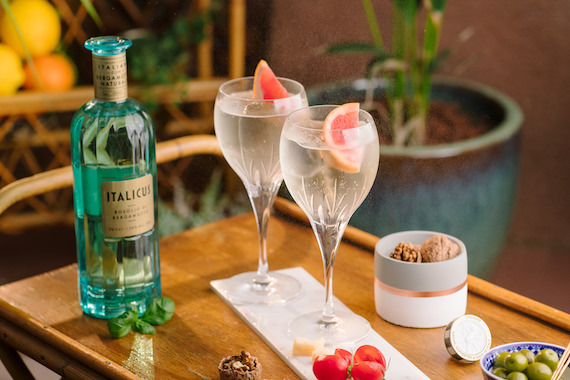While focusing on the forgotten category of Rosolio, Gallo says: “I wanted to build my own legacy and create a product that will redefine the way brands are built in the on-trade.”
“Since I remember, my family has always been making Rosolio at home, with mulberries or lemon or bergamot fruits. I used to help my grandmother peel the bergamots and when I started to study Vermouth I discovered this unknown micro category of Rosolio. Since then, I have always had the intention to revive this category internationally.”
Italicus is based on an ancient recipe “Il Rosolio di Torino" that Gallo found in a book which dates back to the 1800s, called Il Liquorista Pratico by Luigi Sala. This was then combined with “the experience from my own family, and it is made with Bergamot from the south of Italy,” Gallo adds.
A hugely celebrated brand, Gallo believes the success of Italicus came from the vision behind the brand and the clear intention that was set out in the beginning, to “build a brand that inspires young bartenders to create art in liquid form.” A few years later Gallo “can proudly say that we are heading in the right direction and a huge thank you goes to everyone who has believed in this project from the beginning.”

Now with a new book that will outline these beginning years of the brand (rrp £40), Gallo says: “The Art of Italicus book was created to celebrate the brand’s anniversary and the first five years of success for our Art of Italicus campaign, which is our brand platform that brings the Italicus philosophy to the world as ‘Italian art and beauty, in liquid form’”.
“The book illustrates the brand’s inception and my desire to bring back the forgotten category of Rosolio. It describes how the brand was born, as a modern and versatile aperitivo, crafted with natural ingredients from North to South Italy. It represents a journey of rediscovery that also includes more than 50 cocktail recipes and the “opere d’arte” created during the first five years for the brand.”
To create the book, titled the Art of Italicus, the brand partnered with creative team Stranger & Stranger to design and publish. The team also created Italicus’ bottle design and the brand world from the beginning. As Gallo notes: “Starting from a very simple brief, I wanted to bring to life the quintessential ‘Made in Italy’ and what makes this country one of the most inspiring and unforgettable cultures.”
The book takes readers through, as mentioned, the beginnings of the brand, but also through the history and tradition of Rosolio, its signature and provenance. Gallo adds: “This is only the beginning and we hope the book can inspire everyone today, as well as future generations to be bold and keep striving for creativity and innovative ideas. Our industry especially needs this. Our motto is: Don't duplicate, but innovate!”
When looking to the future of the brand Gallo mentions: “In the next five years we wish to keep building this unique brand to become the most premium Aperitivo from Italy in the world, focusing on a sustainable supply chain, and natural ingredients, whilst continuing to support the on-trade worldwide.”




